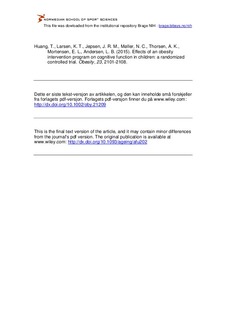| dc.contributor.author | Huang, Tao | |
| dc.contributor.author | Larsen, Kristian Traberg | |
| dc.contributor.author | Jepsen, Jens Richardt Møllegaard | |
| dc.contributor.author | Møller, Niels Christian | |
| dc.contributor.author | Thorsen, Anne Kær | |
| dc.contributor.author | Mortensen, Erik Lykke | |
| dc.contributor.author | Andersen, Lars Bo | |
| dc.date.accessioned | 2016-09-05T11:26:50Z | |
| dc.date.available | 2016-09-05T11:26:50Z | |
| dc.date.issued | 2015-09-04 | |
| dc.identifier.citation | Obesity. 2015, 23, 2101-2108 | nb_NO |
| dc.identifier.uri | http://hdl.handle.net/11250/2404291 | |
| dc.description | Dette er siste tekst-versjon av artikkelen, og den kan inneholde små forskjeller fra forlagets pdf-versjon. Forlagets pdf-versjon finner du på www.wiley.com /
This is the final text version of the article, and it may contain minor differences from the journal's pdf version. The original publication is available at www.wiley.com | nb_NO |
| dc.description.abstract | Objective:
Adiposity may be associated with poorer cognitive function in children. The purpose of the study was to examine the effects of an obesity intervention on cognitive function in children.
Methods:
One hundred and fifteen children were randomly allocated to either the Day Camp Intervention Arm (DCIA) or the Standard Intervention Arm (SIA). Children in the DCIA participated in a 6-week day camp intervention and a subsequent 46-week family-based intervention. The camp intervention mainly consisted of physical exercise and health classes. The SIA was offered one weekly physical exercise session for 6 weeks and one educational meeting. Anthropometrics and cognitive function were measured at baseline, 6 weeks, and 52 weeks.
Results:
At 6 weeks, the improvement in visuospatial construction skills was larger in the DCIA than the SIA (standardized mean difference, 0.47, 95% CI, 0.08 to 0.86, P = 0.02). At 52 weeks, the improvements in emotional control (standardized mean difference, −0.42, 95% CI, −0.68 to −0.16, P = 0.002) and monitoring (standardized mean difference, −0.32, 95% CI, −0.63 to −0.02, P = 0.04) were larger in the DCIA than the SIA. No group differences were observed in changes in other cognitive outcomes.
Conclusions:
The obesity intervention may benefit emotional control, monitoring, and visuospatial construction skills in children. | nb_NO |
| dc.language.iso | eng | nb_NO |
| dc.publisher | The Obesity Society | nb_NO |
| dc.subject | children | nb_NO |
| dc.subject | obesity | nb_NO |
| dc.subject | cognitive function | nb_NO |
| dc.subject | executive function | nb_NO |
| dc.subject | intervention | nb_NO |
| dc.title | Effects of an obesity intervention program on cognitive function in children: a randomized controlled trial | nb_NO |
| dc.type | Journal article | nb_NO |
| dc.type | Peer reviewed | nb_NO |
| dc.subject.nsi | VDP::Medical disciplines: 700::Clinical medical disciplines: 750::Endocrinology: 774 | nb_NO |
| dc.source.journal | Obesity | nb_NO |
| dc.identifier.doi | 10.1002/oby.21209 | |
| dc.description.localcode | Seksjon for idrettsmedisinske fag / Department of Sports Medicine | nb_NO |
